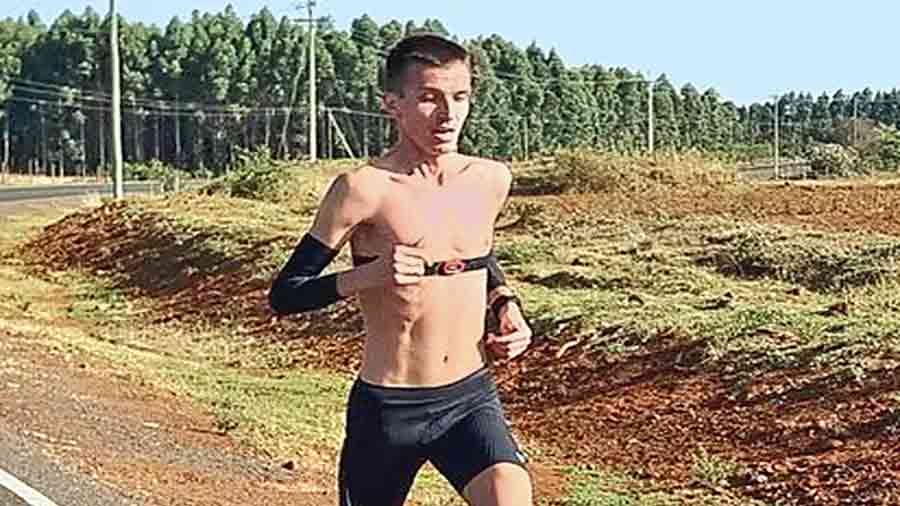The Ukrainian marathoner Mykola Nyzhnyk was asleep in the Kenyan countryside on February 24 when he received a call from his pregnant wife, Olga. Alone in their apartment in Brovary, roughly 20km from Kyiv, she’d heard two explosions, so strong that the windows were shaking, she said. Ten minutes later, a third blast drowned out the piercing siren of car alarms, and she described a growing cloud of smoke in the distance.
Nyzhnyk told his wife to gather their documents and whatever essentials she could fit into a backpack. By the time Olga left their home 30 minutes later to go to a friend’s place in Kyiv, she heard a fourth explosion.
The conversation would change everything for Nyzhnyk, who would soon begin a 8,000-km journey from the hard-packed dirt roads of Iten, Kenya, to his home in Ukraine, where he is answering his country’s call to serve in the war against Russia.
Nyzhnyk, 26, had arrived in Iten on January 27 to train at high altitude in preparation for the upcoming racing season. Nyzhnyk, a professional runner who competed at the Tokyo Olympics, was planning to stay in Kenya until mid-March as he prepared to compete for next month’s Hannover Marathon in Germany.
His life in Iten, 7,800 feet above sea level, had been calm and peaceful. He woke up each day with the Great Rift Valley sunrise and ran for miles on auburn dirt roads that sliced through vast farmland. Afternoon naps were followed by a second training session, a routine that amounted to 200km of running a week.
When Russia’s ground invasion of Ukraine began, he said he was too angry, too devastated, too distracted to train. His training partner, Roman Fosti, a two-time Olympian from Estonia, tried to encourage him to run, hoping it would help him cope. But “he was so broken,” Fosti said.
When the war began, Nyzhnyk received a phone call from the National Guard and was ordered to return to Ukraine. The country’s airspace is closed to civilian flights, so it took Nyzhnyk more than a week to navigate a maze of travel logistics and border restrictions. He left Iten on March 4.
“It’s my duty,” said Nyzhnyk, who is a first sergeant in the National Guard of Ukraine, part of the Ministry of Internal Affairs. “I am very motivated to defend my country.”
Nyzhnyk voluntarily joined the National Guard in 2016, and he represents its sports club in domestic racing competitions. The club comprises 150 of the country’s top athletes, 32 of whom competed at the Tokyo Games. In times of peace, Nyzhnyk doesn’t actively serve, “but in conditions of war, we must defend our country like all military,” he said.
To get from Kenya to Ukraine, Nyzhnyk flew from Nairobi to Budapest, where volunteers in Hungary helped him cross the border. A friend met Nyzhnyk in Khmelnytskyi and took him to a train bound for Kyiv so he could retrieve important documents and his car at his apartment on the outskirts of the city before meeting Olga.
He had hesitated with the decision on arrival in Ukraine. “It is unknown when we will be able to return there again,” he said, referring to his home outside Kyiv.
“I thought about the route while I was still in Kenya, but changed it when I was travelling to Ukraine because the situation here is not simple and difficult to plan everything.”
“I’m not nervous, and I do everything without panic,” Nyzhnyk said on Sunday, as he sat in a crowded yet eerily quiet metro station turned shelter while he waited for curfew to end at 7am.
He was reunited with Olga, who is 32 weeks pregnant, for one day in Lviv. Olga, who is also a professional runner and competed at the 2012 London Olympics in the 10,000m, opted not to leave Ukraine to be close to family. And, she said, “this is my homeland. I don’t want to run away”.
Nyzhnyk is prepared to resist Russian forces for as long as required. “If I need to take up arms I will do it,” he said. “Ukrainians will cope with everything. We will not lose hope and will fight to the end.”
He hopes turmoil will have ceased by the time his wife gives birth to their first child in mid-April. “I would like to give her the name of Myroslava,” Nyzhnyk said of his future daughter. “It means peace.”
(New York Times News Service)











